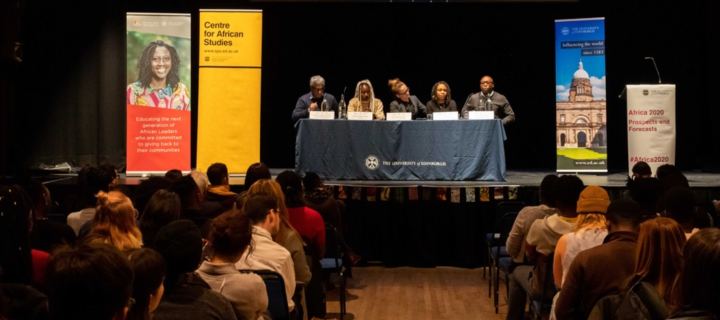Discussing the coming decade for Africa
The fourth annual Africa Prospects and Futures event took place in front of a capacity crowd this January in the Debating Chamber of Teviot Row House.
The event held in partnership between Edinburgh Global, the Centre of African Studies, Royal African Society and the British Council, presents a panel of experts from various backgrounds and disciplines eager to share their knowledge and expertise in regard to the African continent.
This is a unique event that provides the opportunity to hear provocative talks about expectations and the future of African citizens from speakers with different backgrounds and expertise. It's also a wonderful platform to gather and meet up with students, academics and members of the general public with a strong interest in African affairs. The large, lively turnout suggests many are very passionate about the future of the continent!

The panellist for the 2020 event, chaired by Barbara Bompani from the Centre of African Studies, were:
- Professor Imraan Valodia, Economist, Dean of Commerce, Management & Law at Wits University (South Africa)
- Dr Richard Itaman, Lecturer in Comparative Political Economy and Development, King’s College London
- Sandra Garwe, Feminist and Global Health Graduate, University of Edinburgh
- Valerie Amani, Artist, Writer and Designer, from Tanzania
Looking to the future
This year the event widened its scope beyond a forecast of the year ahead to offer a vision of Africa in the coming decade. A broad range of subjects were put before the group who spoke to a lively audience of 150 people including students, academics, representatives of business, culture and other civil society organisations.
Prospects and Forecasts demonstrates the interest there is in Edinburgh to learn about and engage in current debate on the African continent. It was great to have a large number of African students in the audience, who provided great input to the event - a sure sign of the value of a diverse and well represented community on campus.
The panel discussed topics including:
- The environmental and far reaching implications of climate change for a continent of 1.2 billion people
- Societal and gender issues – particularly the need for women to hold more decision-making power on a personal and national scale
- How grass roots initiatives can ensure the right changes are made to help overcome the crippling impact of rising inequality on the continent
- Political issues – like the precarious balance of democracy and stability in countries where ‘Big Man Syndrome’ has influenced national leadership
- Cultural issues such as the repatriation of African works of art
Although it is hard to summarize the artistic consciousness of many countries and cultures into one, I believe that there is an inclination towards redefining freedom in the 'African' context. Freedom through using multimedia to create alternate realities and imagine future societies. Freedom through archiving and owning our current narratives.
Due to the forward-looking nature of the event a key talking point was the importance of young Africans in the coming decade. The panel emphasized the need for a shared sense of responsibility and encouraged attendees to not only support positive change in Africa but to also use their privileged position to create new opportunities for others in their own countries and communities. Panellist Sandra Garwe spoke about progressing from the last 10 years that she considers in many ways a ‘lost decade’ in terms of gender equality. She warned the audience of an accidental elitism within African Feminism in part caused by a problematic disparity between those at grassroots level and the people who speak on their behalf saying: “What should we do if we do not want to lose this next decade? Link different generations- create spaces for young people and leverage technological empowerment. African leadership is old and if young people do not start taking spaces, these leaders will continue to make decisions for futures they are not in.”
Examining important issues
The audience were invited to present questions for the experts to close the event and showed an interest in exploring how African nations might interact with other countries and each other in the years ahead. Members of the audience asked what changes could be made to reduce the influence of Western nations and ensure more agency for future African governments but also challenged the panel to look inwards at the implications of the African Continental Free Trade Area and what being the world’s largest free trade area will mean for Africa.
The Centre of African Studies, with its vibrant cohort of young Africans, provided a dynamic and well-crafted space for engaging with the most topical issues confronting the continent as we go into the 2020s and beyond.
This event and others like it are a great way to bring together those at the University and from wider Edinburgh with an interest in Africa. Events like this support campus-based activities which promote African students, researchers and the University’s links with the African continent. It is just one of the many ways the University of Edinburgh demonstrates its commitment to deep-rooted and distinctive internationalism, attracting the world’s best minds and building innovative global partnerships for research, teaching and impact.
Learn about the work of our Africa Regional Team
Find out more about the Royal African Society
Visit the Royal African Society website

